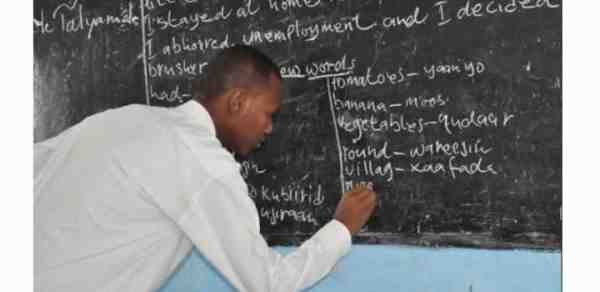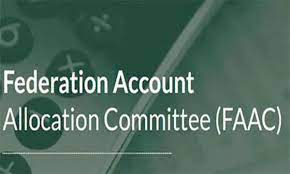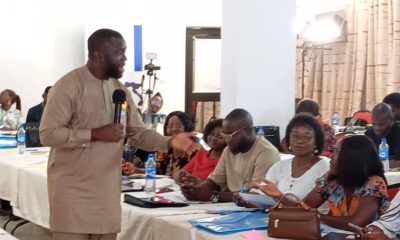Education
WAEC Introduces CBT as Option in Nov. 2024 WASSCE

West African Examinations Council (WAEC) says candidates for the November West African Senior School Certificate Examination (WASSCE) will have the option of choosing between Computer Based Tests (CBT) and Paper Based Tests.
Head of National Office, WAEC, Nigeria, Dr Amos Dangut, stated this in Ibadan on Wednesday while monitoring the ongoing WASSCE, along with some principal officers of the council.
He said that the examination body had successfully conducted the first edition of the computer-based West African Senior School Certificate Examination (WASSCE), also known as CB-WASSCE in January/February.
According to him, private candidates writing WASSCE in November will have the opportunity of choosing between CB-WASSCE and paper-based test.
“The examination, held in January and February, yielded better performance compared to the previous year, with a significant decrease in malpractices from five per cent to 0.8 per cent.
“We are now gearing up for the upcoming private candidates’ examination in October and November, offering candidates the choice between the traditional pen and paper and the computer-based method,” Dangut said.
He said that the initiative was aimed at expanding computer-based examination to rural areas.
“It’s part of our plans to eventually implement computer-based examinations for all schools, in collaboration with the Federal Government and other stakeholders.
“We are also working on providing necessary facilities and training for schools to facilitate this transition,’’ he said.
The WAEC boss said contrary to what skeptics were saying, the transition to CBT method was a success and had reduced malpractices rate significantly.
“In any case, the world is already moving technologically. We also, as part of the global community, must ensure that we move along.
“And we can only do that by equipping our schools, getting the candidates prepared to face what lies ahead of them,” Dangut said.
While expressing satisfaction with the monitoring of WASSCE in some schools in Ibadan, he commended the calm and confident demeanor of the candidates and the conducive examination environment.
“It is my goal to maintain high standards across all schools to ensure fair comparisons of performance,” he said.
Dangut said that he was pleased to see the use of metal detectors and CCTV in some schools, expressing the hope that such practices were widespread.
He stressed the need for adequate infrastructure, well-equipped examination halls and qualified teachers, all of which, he said, were crucial elements for the advancement of the country’s educational system.
Also speaking, Mr Muhammad Musa, the National President, All Nigeria Confederation of Principals of Secondary Schools of Nigeria (ANCOPSS), said the monitoring exercise was an indication that the examination body was proactive.
“WAEC’s goal is to ensure credible and malpractice-free examination, and today’s experience reflects positively on public schools’ efforts.
“Teachers and students alike appear well-prepared, exuding confidence despite our presence,” he said.
According to Musa, to enhance education, the federal government should focus on empowering teachers.
“Well-trained teachers with subject mastery can effectively educate students.
“I encourage schools and government to prioritise teachers’ participation in national and state coordination as well as marking exercises.
“This hands-on experience equips teachers to better understand examination requirements and, in turn, improves their teaching.
“Additionally, government support in terms of infrastructure and qualified educators is crucial for the development of education,” he said.
The News Agency of Nigeria (NAN) reports that WAEC officials on the monitoring team included Prof. Jacob Kwaga, the Federal Government’s nominee in WAEC; Director of ICT, Mrs Olufolake Ajayi and Zonal Coordinator of WAEC, Ibadan, Rosemary Ojo-Odide.
Others were: Director of Human Resources, Mrs Genevieve Chukwudi-Nwoko and Victor Odu. (NAN) (www.nannews.ng)
Education
FG Reconstitutes Committee to Renegotiate 2009 University Agreements

The Federal Government has re-established a seven-member renegotiation committee to address the 2009 agreements with university-based unions.Minister of Education, Prof. Tahir Mamman, at the committee’s inauguration in Abuja on Monday, gave them a three-month deadline to conclude negotiations.
The committee brings together representatives from the Academic Staff Union of Universities (ASUU) and Senior Staff Association of Nigerian Universities (SSANU). Others are Non-Academic Staff of Educational and Associated Institutions (NASU), and the National Association of Academic Technologists (NAAT).Mamman stated that President Bola Tinubu’s government aimed to improve the education system and maintain peace on campuses.He noted that renegotiations began in 2017 but were delayed due to unforeseen circumstances.He said that the previous committee, led by Prof. Nimi Briggs, produced a draft report covering significant areas.The minister urged the reconstituted committee to work diligently and produce realistic agreements addressing the challenges facing the Nigerian University System (NUS).Committee Chairman, Dr Yayale Ahmed, appealed to the government to support universities in achieving global competitiveness and to consider lecturers’ salaries as investments.ASUU President, Prof. Emmanuel Osodeke, thanked the government and expressed hope that the new committee would succeed where previous ones failed.He emphasised the unions’ readiness to renegotiate, provided the government worked towards a stable academic calendar.(NAN)Education
Basic Education’s new Curriculum Commences Jan. 2025 – FG

The Federal Ministry of Education has announced that the new curriculum for basic education will commence across schools in Jan. 2025.
The Minister of Education, Prof. Tahir Mamman disclosed this on Monday in Abuja, at a stakeholders meeting on the implementation of the new curriculum.
Mamman said new curriculum for senior secondary education would also commence by Sept.
2025.He said the new curriculum would address problems of learning crises and employability.
According to him, the new skills acquisition to be introduced would have multiplier effect by equipping students with 21st century skills.
“In the last one year, we have worked with stakeholders to develop a skills framework that will inject skills right from the latter part of basic education to secondary education.
“The whole idea is that, by the time children finished, they should have a minimum of two skills so that they can have a productive life,’’ he said.
The Minister said the meeting was conveyed to discuss the modality and as well tidy some aspects of the curriculum, while also giving timeline for implementation, support, monitoring and evaluation.
He said the next three months would be used for preparatory stage. including preparing teachers guide in using the curriculum.
When asked on the difference between the new scheme and the 6:3:3:4 system of education that also infused skills, he said the problem was the inability to implement the policy.
“The major justification for what we have done has been the inability to implement the 6:3:3:4 system from inception
“The minimum academic standard of 1993 shows a reason for 6:3:3:4 and the Act outlined clearly the learning trajectory of schools in Nigeria.
“It was envisaged that by the time learners finished basic education, they would have acquired skills. Unfortunately, we departed from it,’’ he said.
The Director of Curriculum, Nigerian Educational Research and Development Council (NERDC), Dr Garba Gandu, said the new curriculum would provide prerequisite skills and training for global competitiveness.
Gandu said the curriculum is competency and digital based, as it also aligned with Science, Technology, Engineering, Arts and (STEAM) methods.
The new curriculum includes 15 newly introduced trade subjects for basic education.
The subjects are, basic digital literacy such as information technology, vocational entrepreneurship skills such as building and construction, plumbing and tiling.
Others are hospitality such as hair styling, make-up and services such as construction, GSM repairs, satellite and CCTV installation and maintenance and garment making, among others. (NAN)
Education
Zamfara Gives Reasons for Disengaging 109 Contract Teachers

The Zamfara Teachers Service Board said the recent disengagement of the 109 contract teachers by the state government was not based on ethnic, tribal or religious reasons.
The Chairman of board, Alhaji Muhammad Aliyu-Anka, stated this while speaking to newsmen in Gusau on Friday.
The state government recently announced the dismissal of 109 contracted teachers over failure to abide by the government contract policy.
“You know, the disengagement of the teachers was not on ethnic, religious or tribal reasons, it was for the interest of the state.
“You know Gov. Dauda Lawal declared a state of emergency on the education sector of the state.
“The state government embarked on massive infrastructural investment on education across the state,” Aliyu-Anka said
He said that the provision of qualified and regular teachers was necessary to achieve the government’s policy.
He said that some of the teachers had abandoned their contracts and they were teaching at private schools while still collecting salaries from the government.
Aliyu-Anka said, “The board recommended the termination of the contracts of teachers who did not abide by the rules and regulations of the state.
“Many of the disengaged teachers were not attending schools to teach, leaving volunteers to teach the pupils.”
The chairman stated that the volunteer teachers were more qualified and they were not receiving salaries from the state government.
He said,”Considering the roles played by the volunteers in our schools, the state government plans to recruit 2000 teachers to fill the gaps by the disengaged teachers.” (NAN)



















